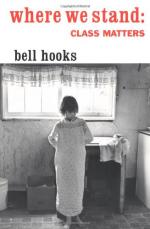|
This section contains 619 words (approx. 2 pages at 400 words per page) |

|
Where We Stand: Class Matters Summary & Study Guide Description
Where We Stand: Class Matters Summary & Study Guide includes comprehensive information and analysis to help you understand the book. This study guide contains the following sections:
This detailed literature summary also contains Topics for Discussion on Where We Stand: Class Matters by Bell hooks.
Bell Hooks' book, "Where We Stand: Class Matters," is an account of Bell's personal and professional journey in a society that is plagued by classism, racism and sexism. Bell was born and raised in a segregated black community in a small town in Kentucky. Although race was discussed rather overtly, the subject of class was never broached. Bell's parents were hard-working people who had nothing left for luxuries after providing the basic essentials for their seven children. Bell and her siblings would long for material things—clothes and expensive gadgets—that other children had but instinctively knew that they could not have them. The scars from unanswered dreams and shattered hopes provide a tough lesson for a child and, as Bell can testify, one that lingers for years.
Bell was the first person in her family to attend college. Bell's freshman year at school was spent at an all girls college because it was close to home and her parents would not have to pay any tuition. Bell was quick to recognize that the all-white school was not the right environment for her. An astute teacher recognized Bell's intellect and was instrumental in getting her a scholarship to Stanford University. Her father was against her going that far away and her mother feared she'd be exposed to racial abuse at the upper class institution.
Bell instinctively knew that Stanford was the right place for her and although she did confront racism and classism, Bell was able to use those encounters as learning experiences—experiences from which she would draw years later when she became a renowned writer on a variety of societal issues. Bell became involved with a fellow student and lived with him for twelve years. They bought a house together and when they broke up, Bell began to feel the economic crunch a woman who separates from her husband or partner encounters as a single woman. She went on to earn a doctorate in literature and accepted a low-paying teaching position at Yale University. Later, she transferred to Oberlin College where she received a pay increase and was able to save enough money to buy a small house with all cash. After these tenures as a professor, Bell finally was able to pursue the career of her dreams—writing. She has written around thirty books, most of which cover important issues facing society.
Through her journey, Bell stayed true to her roots and values. Although she had climbed up the ladder of success, she was careful never to forget who she was and remain connected to her past. Bell wrote "Where We Stand: Class Matters," based largely on her personal experience of moving up in class status due to her phenomenal successes. Although she earned a lofty spot in the upper class, she found barriers still existed due to her race. She also found that relatives and friends from her past were confused and suspicious of her. They questioned why she still lived conservatively although she had the money to live in a much grander manner. Some distrusted her, thinking that ultimately she would abandon them for her high class colleagues.
In addition to her other work, Bell Hooks is also a renowned feminist and, as a black woman who worked her way up, has never forgotten her humble beginnings. She is an advocate of the redistribution of wealth which, she feels, would provide the answer to global poverty without causing the poor to feel shame. Bell Hooks has drawn from her personal experiences and professional background and education to write this book which brings to the forefront the damage that classism does on an individual and communal level.
Read more from the Study Guide
|
This section contains 619 words (approx. 2 pages at 400 words per page) |

|



